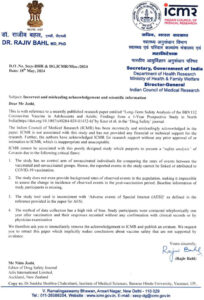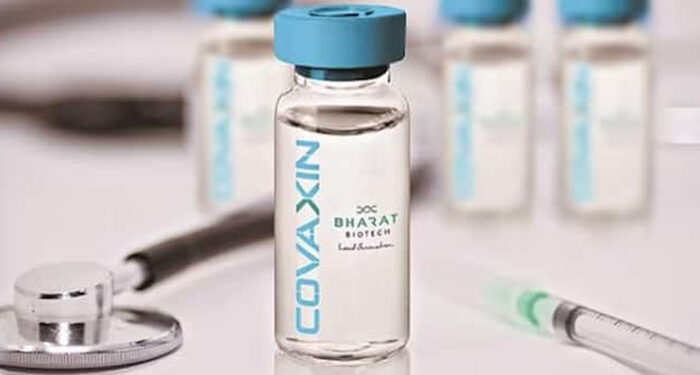NEW DELHI, MAY 20
The Indian Council of Medical Research (ICMR) on Monday said the concerns raised on the safety of the Covaxin vaccine after the publication of a research paper, titled “Long-Term Safety Analysis of the BBVl52 Coronavirus Vaccine in Adolescents and Adults: Findings from a l-Year Prospective Study in North India”, authored by Kaur et al. in the Drug Safety journal is misleadingly and erroneously acknowledges the Indian Council of Medical Research. ICMR is not associated with this study and has not provided any financial or technical support for the research.
In a release issued here, Dr Rajiv Bahl, Director General, ICMR said that he has written a letter to the authors of the paper and Editor of the journal to remove the acknowledgement to ICMR and publish an erratum immediately. He also flagged the poor methodology and design of the study.

In his letter Dr Rajiv Bahl also highlighted that ICMR was acknowledged for research support without any prior approval of or intimation to ICMR, which is inappropriate and unacceptable. He stated that ICMR cannot be associated with this poorly designed study which purports to present a ”safety analysis” of Covaxin due to the following critical flaws:
- The study has no control arm of unvaccinated individuals for comparing the rates of events between the vaccinated and unvaccinated groups. Hence, the reported events in the study cannot be linked or attributed to COVID-19 vaccination.
- The study does not even provide background rates of observed events in the population, making it impossible to assess the change in incidence of observed events in the post-vaccination period. Baseline information of study participants is missing.
- The study tool used is inconsistent with ‘Adverse Events of Special Interest (AESI)’ as defined in the reference provided in the paper for AESI.
- The method of data collection has a high risk of bias. Study participants were contacted telephonically one year after vaccination and their responses recorded without any confirmation with clinical records or by physician examination.
He also noted that similar acknowledgements to ICMR have been made in previous papers without permission, raising concerns about the authors’ practices.
The authors have been urged to immediately rectify the acknowledgment to ICMR and publish an erratum. Apart from this, they are asked to address the methodological concerns raised. Failure to do so may prompt ICMR to consider legal and administrative action.
The Editor has been asked to retract the paper which implicitly makes conclusions on vaccine safety which are not supported by evidence, the release added.












